Health experts have long said that eating at least two servings of fish a week is good for your heart because fish has omega-3 fatty acids that your body needs. But there are so many options to think about, as well as worries about toxins.
Julia Zumpano, RD, LD, is a registered dietitian who can help you find the right fish to eat to get the right amount of omega-3 in your diet.
What good things come from eating fish?
Essential fats are what we call omega-3 fatty acids because we need them to live. The hard part is that our bodies can’t make this kind of acid.
Fish comes in at this point.
Zumpano says that fish is the best place to get omega-3 fatty acids. “To make things more interesting, fish is a good source of EPA and DHA, two types of omega-3 fatty acids that our bodies need.”
The letters EPA and DHA stand for eicosapentaenoic acid and docosahexaenoic acid, respectively. ALA is an omega-3 fatty acid that can be found in some plant-based foods (alpha-linolenic acid).
“Taking between 1 and 4 grammes of omega-3 every day can improve heart health,” she says. “It also lowers the chance of dying for people with heart disease and irregular heartbeats.”
Omega-3 makes them less likely to die by:
- Getting rid of the chance of blood clots.
- Keeping the arteries from getting clogged with plaque.
- Bringing down the number of triglycerides in the blood.
- Lowers blood pressure a little bit.
- Slowing down the production of things in the body that cause inflammation.
How much fish you should eat also depends on whether or not you have heart disease. If you have never had heart disease, eat at least 6 to 8 ounces, or about two servings, of fish a week. Adults who are healthy can eat up to 12 ounces of fish each week, according to FDA guidelines. If you do have heart disease, keep your omega-3 intake to about 1 gramme per day. Your doctor may even tell you to take supplements, but this will depend on your condition. Talk to your doctor about how much you should eat.
The best fish to get omega-3 fats from
- Atlantic Mackerel: 2.5 to 2.6 grammes
- Atlantic and farm-raised salmon – 1.8 grammes
- Herring: between 1.7 and 1.2 grammes
- Tuna – Bluefin – 1.6 grammes
- Lake trout: between 1.6 and 1.3 grammes
- Farmed catfish: 1.15 grammes
- Anchovy – 1.4 grammes
- Tuna – Albacore – 1.3 grammes
- Freshwater lake white fish: 1.3 grammes
- Sardines – 1.3 grammes
- 1.2 grammes: Bluefish
- Halibut – 0.9 grammes
- 0.9 grammes Pollock
- Striped bass weighs 0.8 grammes
- Mixed-species sea bass – 0.65 grammes
- White meat tuna in a can drain – 0.5 grammes
- Flounder or sole – 0.48 grammes
- 0.29 grammes of shrimp
Zumpano says, “Eat a variety of fish to help reduce the possible bad effects of mercury and other environmental pollutants.” “Make sure to check local and state advisories about the safety of fish caught in lakes, rivers, and coastal areas.”
What about toxins in the water that gets into fish?
The risks of eating fish depend on how old you are and how healthy you are. The American Heart Association says that most healthy adults are better off eating fish than not.
“Children and women who are pregnant or breastfeeding shouldn’t eat mercury-rich fish,” she says. “Some fish have more mercury and environmental toxins than others. Toxins might be less likely to get into your body if you remove the skin and top layer of fat before cooking.
Shrimp, canned light tuna, salmon, pollock, and catfish are five popular fish or shellfish that have less mercury. On the other hand, sharks, swordfish, king mackerel, and tilefish like golden bass and golden snapper are some of the worst offenders.
What if I’m allergic to fish or don’t like it?
Some people don’t like fish or can’t eat it because they have allergies. You’re in luck because omega-3 fatty acids (ALA) are also found in plant-based foods, though in much smaller amounts than in fish.
These are what Zumpano suggests:
- Flaxseed (milled or oil).
- Walnuts.
- Soy products.
- Canola oil.
- Algae or algae oil.
- Foods that have omega-3 algae oil added to them.
- Chia grains.
- Hemp seeds.
She says, “Adding these to your diet could be good for your heart.” “However, there are no set recommendations for how much omega-3 you should eat from them.”
